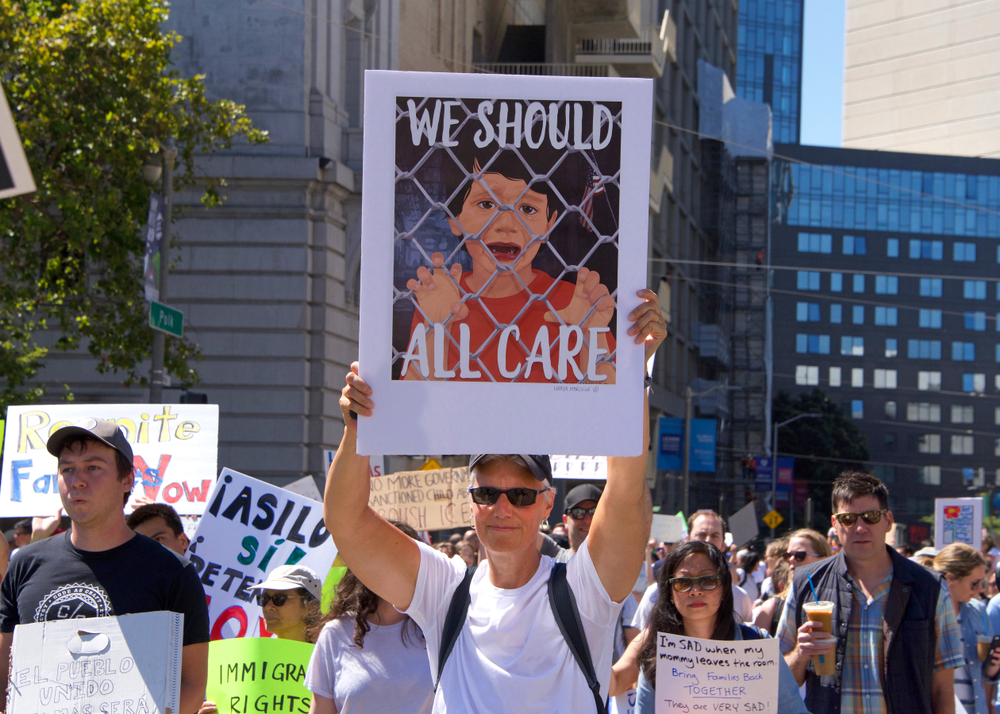Editorial credit: Sheila Fitzgerald / shutterstock.com
The Trump administration’s family separation policy marked one of the most traumatic episodes in recent U.S. immigration history. Thousands of children were taken from their parents at the U.S.-Mexico border under the “zero tolerance” policy, with no effective system in place to track or reunify families. Many parents were deported while their children remained in U.S. custody or foster care, triggering a wave of family law crises across the country—including in New York State.
Even beyond the border, aggressive ICE enforcement, raids, and prolonged immigration detention had far-reaching effects on family unity. Immigrant parents—many undocumented—found themselves facing child custody battles, child welfare investigations, and guardianship disputes, often with little access to legal representation. As federal protections weakened under the Trump administration, the burden of defending family integrity fell to local and state legal systems.
In this context, New York State family law attorneys became frontline defenders of immigrant families. This article outlines the key legal strategies attorneys can use to advocate for their clients in the face of immigration-driven family law disruptions.
- Assisting in Family Reunification Across Borders
When immigrant parents are deported while their children remain in the U.S., reunification becomes both a legal and logistical challenge. Custody, immigration status, and cross-border coordination complicate these cases.
Attorney Strategies:
- File emergency petitions in family court to establish or reassert custody rights, especially if relatives in the U.S. are caring for the child.
- Request special findings to help the child qualify for immigration relief, such as Special Immigrant Juvenile Status (SIJS).
- Coordinate with consulates and NGOs to assist with documentation, travel, and safe repatriation or reunification.
- Use UCCJEA (Uniform Child Custody Jurisdiction and Enforcement Act) strategically to establish New York jurisdiction when possible.
- Representing Immigrant Parents in Child Protective Services (CPS) Cases
Immigration status has often been used—either directly or implicitly—as a factor in CPS investigations and family court proceedings, despite legal protections against such bias.
Attorney Strategies:
- Challenge the use of immigration status as a factor in fitness assessments, relying on NYS case law affirming that undocumented status alone is insufficient to deem a parent unfit.
- Demand culturally and linguistically appropriate services, such as parenting classes and visitation support, particularly for non-English-speaking clients.
- File motions for relatives to serve as kinship caregivers, avoiding foster placements that may lead to severed parental rights.
- Monitor for procedural violations, such as failure to provide notice to deported or detained parents during child welfare proceedings.
- Guardianship Planning and Advocacy
For undocumented parents or those at risk of detention, appointing a legal guardian is a proactive way to protect child custody and care arrangements in case of immigration enforcement.
Attorney Strategies:
- Prepare standby guardianship petitions under Article 17-A or 17 of the Surrogate’s Court Procedure Act, allowing trusted individuals to assume custody if the parent is detained or deported.
- Include trigger events like arrest, ICE custody, or removal orders in guardianship designations to ensure smooth transitions.
- Educate clients on notarized caregiver affidavits, which can offer short-term protections while court processes are pending.
- Ensure alignment with immigration and custody planning, particularly if the guardian is not a U.S. citizen or has uncertain status.
- Navigating Custody Disputes Involving Detained or Deported Parents
Detained or deported parents often face an uphill battle in asserting custody, especially when the other parent or foster system claims they’ve “abandoned” the child.
Attorney Strategies:
- Assert parental rights aggressively, emphasizing that physical absence due to government custody does not equal abandonment under NY law.
- Request video or telephonic court appearances when a parent cannot appear in person due to detention.
- Challenge Termination of Parental Rights (TPR) petitions based on mischaracterization of the parent’s situation or lack of notice.
- File for custody modifications where circumstances change, including the release of the parent from ICE custody or changed living arrangements.
- Securing Immigration Relief Through Family Law Findings
New York Family Courts play a crucial role in helping immigrant youth obtain immigration relief, such as Special Immigrant Juvenile Status (SIJS), which can lead to lawful permanent residency.
Attorney Strategies:
- File guardianship or custody petitions for minors who have been abandoned, neglected, or abused by one or both parents.
- Request SIJS-specific findings as part of the court’s final order, including: (1) the child’s eligibility; (2) reunification is not viable; and (3) it’s not in the child’s best interest to return to their country of origin.
- Coordinate with immigration counsel to ensure the family court order meets USCIS evidentiary standards.
- File SIJS motions promptly, given backlogs and visa caps that affect availability based on country of origin.
- Protecting Victims of Domestic Violence and Family Separation
Many immigrants fleeing domestic violence face compounded legal risks—especially if they are undocumented or their status is tied to an abusive spouse.
Attorney Strategies:
- File for orders of protection, emergency custody, and spousal support, even if the client is undocumented.
- Pursue VAWA (Violence Against Women Act) relief, which allows immigrant victims to self-petition for legal status.
- Help clients collect evidence, such as police reports, medical records, and affidavits, to support both family and immigration petitions.
- Work with shelters and social workers to develop safe custody arrangements for children.
- Ensuring Due Process for Parents in Immigration Detention
When parents are detained, their access to family courts, CPS proceedings, and visitation may be severely curtailed—raising serious due process concerns.
Attorney Strategies:
- Demand accommodations such as court teleconferencing or rescheduling to ensure the parent’s participation.
- File for adjournments when parents are in transit between ICE facilities or cannot be reached for legal preparation.
- Advocate for court-appointed counsel or interpreters in custody and guardianship cases involving detained immigrants.
- Work with immigration attorneys to file parole or bond requests that emphasize the client’s parental responsibilities and pending custody proceedings.
- Empowering Clients Through Legal Education and Preventive Planning
Many immigrant families are unaware of the legal tools available to preserve family unity in the event of immigration enforcement.
Attorney Strategies:
- Offer community workshops in multiple languages about standby guardianship, SIJS, family court basics, and child welfare rights.
- Create emergency family plans, including notarized power of attorney, consent forms for medical care and school enrollment, and lists of key documents.
- Encourage pre-need legal planning, especially for mixed-status households and single-parent families.
- Distribute resources through trusted community partners, including schools, churches, and immigrant support organizations.
Conclusion
The Trump-era family separation policy cast a long legal and emotional shadow. Thousands of immigrant families were torn apart—sometimes permanently—due to a federal approach that prioritized enforcement over humanity. In New York, family law attorneys continue to deal with the fallout, fighting to reunite families, defend parental rights, and ensure children do not lose their loved ones to policy failures and systemic neglect.
Legal representation in these cases is not just about custody orders and court filings—it’s about restoring human dignity and protecting the sanctity of family. Through strategic litigation, guardianship planning, and immigration-court coordination, NYS attorneys can be powerful agents of healing and justice for some of the most vulnerable families in the country.




